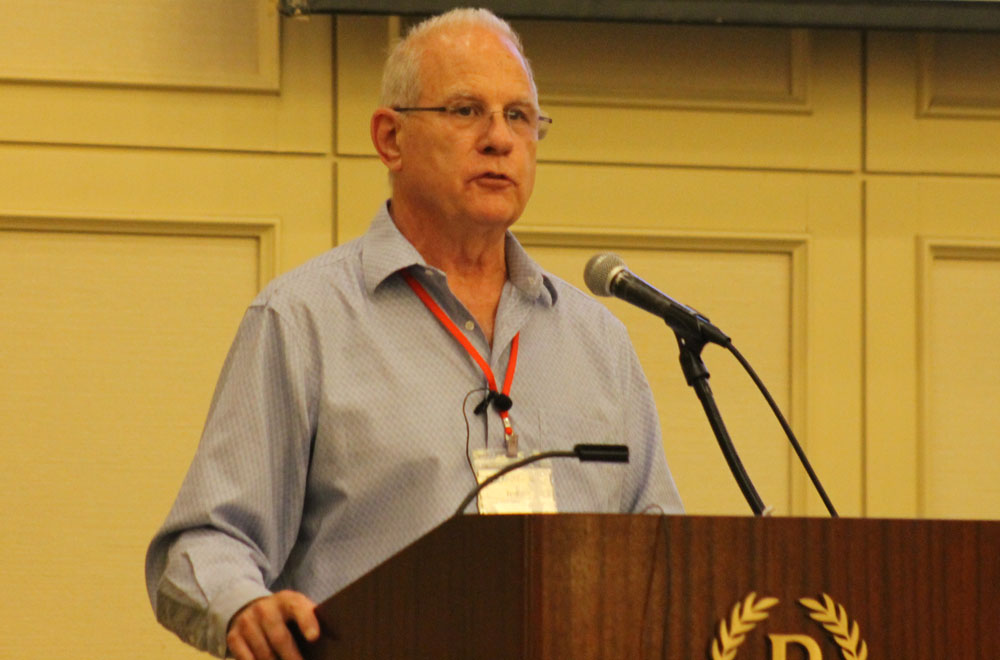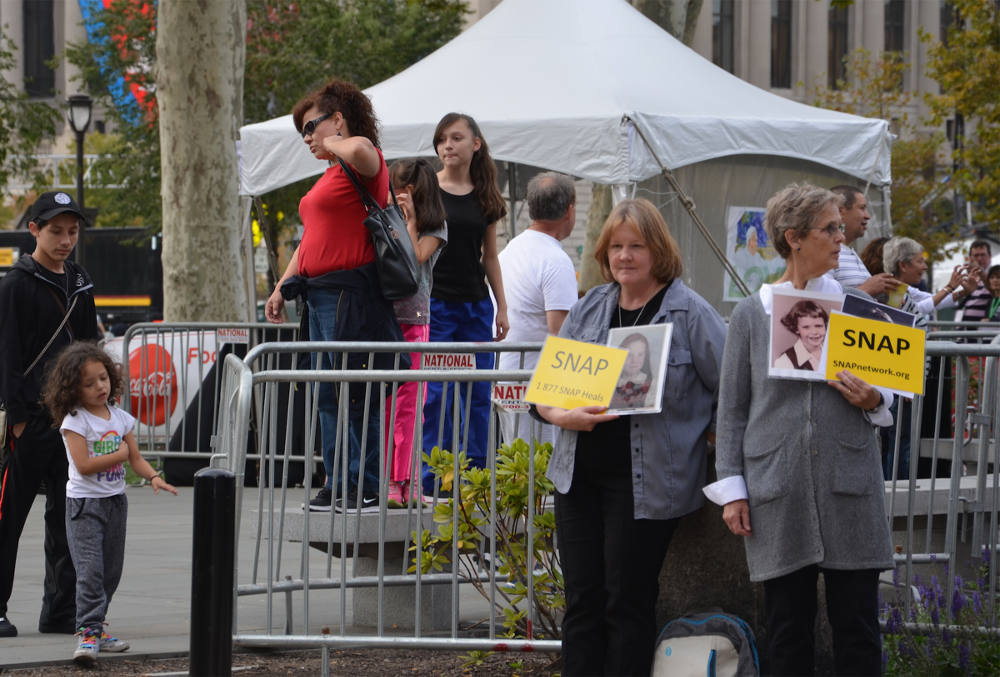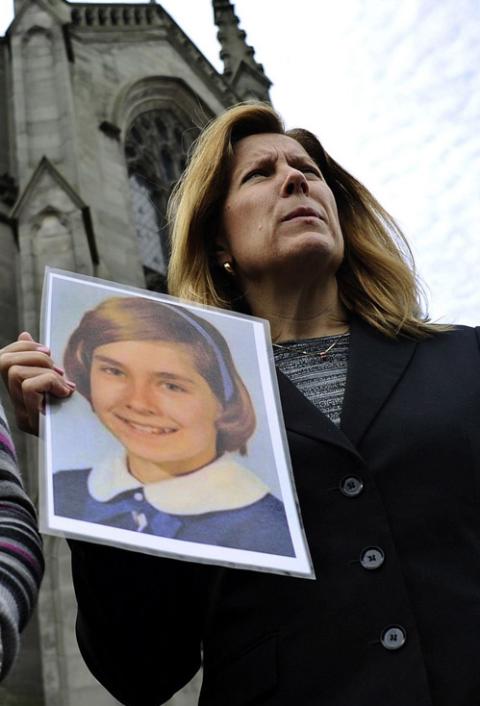The annual conference of the Survivors Network of those Abused by Priests, held July 6-8 in Chicago, marked 30 years since Barbara Blaine founded the abuse survivors' advocacy organization. (NCR photo/Brian Roewe)
The program for the 2018 conference for the Survivors Network of those Abused by Priests offered little subtlety in its front-cover messaging.
"30 years strong. We've only just begun."
Four years earlier at the annual gathering, also here in the same city where SNAP formed in 1988, founding member Peter Isely proposed a comma as the proper punctuation as the now global network hit the quarter-century mark: a pause to recognize its achievements as the leading advocate group for survivors of clergy sexual abuse, and to determine where it would head next.
A similar exercise at the 2018 conference, held July 6-8, would likely land at a question mark.
In the span of 15 months, a flurry of resignations shed SNAP of leadership that guided it throughout three decades: founder and president Barbara Blaine (resigned February 2017; died in September 2017); longtime national director David Clohessy (resigned December 2016); outreach-director-turned-executive-director Barbara Dorris (resigned March 30); and board president Mary Ellen Kruger and board member Mary Dispenza (resigned March 20).
The upheaval has left many in and outside of SNAP asking about its future, amid a present teeming with transition and uncertainty. At the onset of the conference — its 130 registered participants less than half of the 2017 conference — board president and acting administrator Tim Lennon sought to ease concerns around one primary question: Will SNAP survive?
"We continue to change the world. Challenge powerful institutions. Raise awareness. Our work continues," he said in his introductory comments.

Tim Lennon, president of the board of the Survivors Network for those Abused by Priests, speaks July 6 during the annual SNAP conference, held this year in Chicago. (NCR photo/Brian Roewe)
Speaking to NCR a day later, Lennon, a board member since 2010, was more direct: "I want to assure people that SNAP is continuing, in the sense of the services that we provide, the support that we provide to survivors. That we'll continue to do advocacy, raise community awareness. That that mission is going to continue and be propelled forward."
To that end, SNAP, with 25,000 members worldwide, is in the final stages of hiring a new executive director, whittling a list that began with 60 serious candidates to a final four — none being current members. New local leaders are in place in Austin, Texas; Dubuque, Iowa; Orlando and Philadelphia. On Friday, it rolled out a new website with an emphasis on social media and connecting more survivors via video and a virtual community (this year's conference, the 15th SNAP's held, was the first to be live streamed).
The network, Lennon added, is "in great financial shape."
'Willing to keep going'
The focus on increasing communication came as leaders questioned what caused the shakeup. For many, the losses of Blaine and Clohessy were cushioned by Dorris being named executive director. In her 16 years with SNAP, mostly as outreach director overseeing its survivor support efforts, Dorris had gained a reputation as a beloved and capable leader.
"She was so dedicated. It was her passion," said Judy Jones, a SNAP leader since 2003 based outside St. Louis, now home to SNAP's main office and from where Dorris and Clohessy worked for years. "She's been hurt. And I think that we can go on without her. It's not going to be easy."

Becky Ianni, left, and Barbara Dorris, in a 2015 file photo, outside the Cathedral of Sts. Peter and Paul in Philadelphia where they shared stories of sexual abuse by priests (RNS/Taylor Nakagawa)
Dominican Fr. Thomas Doyle, who on the conference's closing day received the inaugural Barbara Blaine Founders Award, told NCR that longtime members expressed to him frustration with a lack of openness from the board regarding the departures.
"They want transparency, they want honesty. Don't play games," he said.
Lennon contends the leadership shakeup, while raising anxieties among some survivors, has not been significant for the vast majority of members, and he's heard much enthusiasm for SNAP's next chapter, as have other board members. But they acknowledge the deep concern experienced by local leaders — all volunteers and among its most active and passionate members.
At a leaders' meeting before the conference's start, the group sought clarity from the board on the departures. Participants described it as an open, honest, emotional and, at times, intense discussion. Jones said she arrived at the meeting "feeling very angry" but afterward "felt much better. More at peace."
"I'm still on guard a bit, but I'm willing to keep going because SNAP has made such a name for itself. We worked so hard and victims need us," she said.
"I think we're still buying in," added her husband Steven Spaner, who has overseen SNAP's expansion into Australia. "Trying to put the ship back on its course."
Cultivating new leadership
The hiring of an executive director is seen as a key step to righting the ship, expected some time later this summer.
Lisa Kendzior, a new board member involved with the search, described an ideal hire as an experienced executive director, "an outsider [who] is going to be coming in and looking afresh" at SNAP. While being a face of the network is a requirement, it's unclear to what degree the new director will carry on the often contentious public advocacy that became synonymous with SNAP under Blaine and Clohessy, known for regular demonstrations and press conferences around the country. Kendzior, herself not an abuse survivor, pointed to their rank of talented local leaders, saying, "We'll all be stepping up."
In an effort to include local leaders more in SNAP's decision-making, the board set up an online platform where organizational documents are posted, and discussions are taking place on possible changes to its mission statement, board bylaws and whether a name change may be needed.
"We want to cultivate the leadership, recruit new members and make sure that they have a part in the future of SNAP," Lennon said in his closing remarks.
While members offered unabashed praise for Blaine's work in forming and growing SNAP — her name and legacy were routinely cited throughout the conference — they chalked up some of the turmoil to a lack of a transition plan following her departure and the organization experiencing a bout of "founder's syndrome."
"It takes a genius and brilliant skillset to start an entity like this, but it's a different skillset to get it to a different level," said Esther Miller, SNAP Los Angeles leader. "Which now is an opportunity for newness for SNAP."

Barbara Blaine, pictured in a 2010 photo (CNS/Dylan Martinez, Reuters)
She said the leadership shake-up initially shook her, too, but after a pause, realized she and other leaders were well-trained and prepared to carry SNAP forward.
"We're fully equipped," she said. "Many of us have been in this longer than 16 years."
Support and advocacy, going forward
What newness looks like for SNAP remains a developing picture.
A major area of continuing focus has been outreach beyond the Catholic Church. The 2018 conference, like recent iterations, presented additional voices, in this case from Amish, Jewish and Christian Fundamentalism communities. Catholic-focused sessions still dominated, among them presentations by Doyle, BishopAccountability.org and Chilean abuse survivor Juan Carlos Cruz.
"We don't check IDs at the door. We welcome all," Lennon said.
SNAP has prioritized partnering with other organizations involved in the area of sexual abuse — its program listed two dozen such groups — in order to establish links as part of a larger, and stronger, human rights movement.
By being on the forefront of the sexual abuse issue, SNAP has helped victims "to come forward in all realms," said Boston attorney Mitchell Garabedian, who represented hundreds of victims of former priest and serial molester John Geoghan. He sees SNAP as going through "growing pains" but believed it still has a role as "a public conscience for society."
What SNAP does not intend to change is its dual-purpose structure of peer-to-peer support groups and unbridled public advocacy. Emphasis, however, is another question.
Miller points to Blaine's initial reason for forming SNAP, which was to provide self-help groups. Calling them SNAP's "heartbeat," she senses a desire to rededicate to the healing aspect. Several people observed the conference, which Miller, a life coach, helped plan, placed a heavier emphasis than past years on healing and therapeutic sessions and speeches. The program, as it has in past years, restated that "SNAP is foremost a self-help support group."
Any shift toward healing would not equate abandoning advocacy, Lennon said.
"There's still the fire in the belly to take on the work, to expose the abusers, to raise community awareness, around statute of limitations, protecting children," he said.
Rather than striking a balance, SNAP should decide who it is, an advocacy organization or a place for healing, said Mary Gail Frawley O'Dea, a psychologist who has worked with sexual abuse survivors for 30 years. While SNAP has done great work as a survivors' advocate, she is skeptical of any success it's had in healing, recalling past patients who participated in SNAP groups say that they grew tired of the anger.
"Survivors have to get angry to heal," O'Dea said, calling it a way to get past self-blame and shame. "But then you go on, right? And you get past the anger into grief, which is really, really hard."
She criticizes SNAP for not utilizing professional counselors, and points to research indicating self-help groups as ineffective for abuse survivors.
SNAP has defended its support groups as intentionally peer-to-peer and says it regularly refers participants to therapy and counseling resources. Local leaders receive a manual that includes instructions on how to start and lead a meeting, as well as guidance on how to respond when someone shares their abuse the first time, follow-up communications and resources for therapy and dealing with traumatized victims. Training takes place twice a year.
O'Dea suggested a model where SNAP focuses on advocacy while partnering with established therapeutic organizations. If it decides to continue to do both, she said they should split into two organizations with separate boards and staff.
"One is a clinical function, and one is a political function," she said. "And there's room for both, but you gotta decide which one you're going to do and nary the twain should meet, I don't think."
Renewed attention to abuse
What's less disputed is the need for SNAP's continued advocacy, with sessions at the conference providing example after example of the church's continuing abuse scandal.
Anne Barrett Doyle, co-director of BishopAccountability.org, observed, "There has not been a seven months like this in the movement, I would say, since 2002," recapping key moments from the past year:
- Pope Francis and the Chilean abuse scandal;
- The continued fallout from the Australia's Royal Commission, including Cardinal George Pell's pending trial date;
- In France, a cardinal and the prefect for the Congregation for the Doctrine of the Faith preparing to stand trial on accusations of failing to report abuse;
- In the U.S., police raiding the home of the Saginaw, Michigan, bishop and diocesan offices, credible accusations brought against Cardinal Theodore McCarrick and the looming Pennsylvania grand jury report;
- And at the Vatican, an investigation into allegations of abuse within a seminary that houses altar boys for papal Masses.
In addition, a handout from BishopAccountability identified 157 priests credibly accused of abuse that it added to its database since the 2017 SNAP conference. Co-director Terry McKiernan noted that while much has been learned about the scope of abuse and cover-up in larger dioceses, "there are many dioceses where we know next to nothing."
Outside the church, reporting on abuse scandals in Hollywood, USA Gymnastics, college campuses and the #MeToo Movement has pushed public awareness of sexual abuse to new heights. The question now for groups like SNAP, observers say, is what to do with the renewed focus.
"I think SNAP has succeeded in drawing attention, and now everybody has their antenna up. And so now that we have everyone's attention, what can we do?" said Victor Vieth, senior director of the Gundersen National Child Protection Training Center, in Winona, Minnesota.
Vieth, who spoke at the conference July 7 on the spiritual impact of child abuse, identified mental health, spiritual care and seminary reform — through increased training for ministers on trauma treatment — as new areas for advocacy. Others highlighted statute of limitations reform, with legislation up for debate in Pennsylvania and New York.
Dominican Fr. Tom Doyle speaks during the annual SNAP conference, July 7. The next day, Doyle received the inaugural Barbara Blaine Founders Award for his three-plus decades work in exposing the church's clergy sex abuse scandal. (NCR photo/Brian Roewe)
Several people inside and outside SNAP believe it needs a new energetic public presence like Clohessy (who attended part of the conference), whether from a single person or new leaders, that is able to respond quickly as events unfold. In 2018, that also means aptitude with various social media, where SNAP has roughly 4,000 followers on both Facebook and Twitter.
Doyle said the mass resignations of Chile's bishops, with Francis so far accepting five, showed that confrontational tactics, including demonstrations, can still yield results.
"Because that way, one message that comes out is we're not afraid of you and we're still looking at you," he said.
Doyle, whose own work exposing the clergy abuse scandal predated SNAP by six years, said there remains a need to keep the network viable, but how it navigates its transition will ultimately depend on leaders listening to the members.
"We need an organization as a backup," he said. "Something that the survivors can identify with when they want to do some kind of action or they want to speak about it. That's the value of having SNAP."
"I will give everything I got to keep it alive and well, because I know it has saved lives," board member Kendzior said. "And if we won't do it, who's going to do it?"
[Brian Roewe is an NCR staff writer. His email address is broewe@ncronline.org. Follow him on Twitter: @BrianRoewe.]
Advertisement








